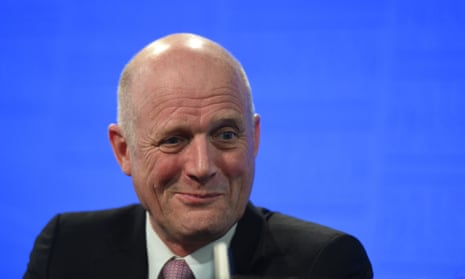Now and again you hear talk of a rapprochement, or even cooperation between libertarians and the left. This chatter usually starts with lefties rather than libertarians themselves, who are, for all their flaws, not predisposed to compromises or half-measures.
The story goes that we share some common ground. Sure, libertarians want to gut what remains of the welfare state, give free rein to hate speech and tilt the industrial relations balance in favour of employers.
But wait: many of them want to allow people to die with dignity. They often support same-sex marriage. Oh, and they are relaxed about weed.
In the mid 2000s, many were impressed by the libertarian stance against neocon-inspired wars. More recently, they’ve been seen to oppose misguided attempts at internet censorship and the seemingly limitless extension of the national security state.
What if we could find a way to work together…
Thoughts such as these led progressives in the US to help out with Ron Paul’s presidential campaigns. It even led some to cautiously welcome the accidental election of David Leyonhjelm to a position of potential influence in a divided Australian Senate.
My suggestion would be that when it comes to support, we should pay on results. Leyonhjelm offers a real-world example of a self-declared libertarian with power. So it’s relevant to ask what his tenure so far tells us about the degree to which there are in fact shared values to be built on. Is Leyonhjelm a friend or a foe?
On the debit side of the ledger, he has consistently voted and spoken against the expansion of surveillance and has also generally opposed more draconian anti-terrorist measures on free speech grounds. It hasn’t stopped the massive expansion of Australia’s security state under Tony Abbott, but if we hold that against him, we’d have to hold it against the Greens as well.
.@KetanJ0 I don't think it's honourable to take taxpayer funds unless you're poor. Wind companies ain't poor.
— Helen Dale (@_HelenDale) June 12, 2015
Unfortunately, it’s difficult to point to very much beyond the failed effort to rein in this expansion of state power. And I think almost everything else he’s done has been pernicious.
For one thing, his crucial support has helped deliver an inquiry into windfarms, concocted on the basis of their alleged health effects, and conceived in order to delegitimise renewable energy and delay its implementation.
No reputable scientist takes this link seriously. And a Twitter conversation between Ketan Joshi, a renewable energy expert who works for the wind industry, and Leyonhjelm’s adviser Helen Dale, hints that perhaps the Senator’s office doesn’t either.
Of health fears over windfarms, Dale tweeted that “If I can use them to get the far more damaging industry policy dumped, I will” – in other words, the inquiry is useful if it shuts down a policy that libertarians find objectionable for reasons that aren’t related to health.
So it’s not just that they are regressive on renewable energy, but that they may be willing to violate a basic norm of democratic respect to shut down, or stonewall, a component of renewable energy.
There are many other examples of Leyonhjelm hobbling or trying to dismantle progressive policy. He voted for defunding public broadcasting, welfare cuts, privatisation and fracking. He voted against bans on supertrawlers and investing in renewables.
Perhaps most disturbing, though, are Leyonhjelm’s views on Indigenous Australians. It’s not so much his substantive view on the subject of constitutional recognition, as the reason he gives for holding it.
Last Friday – and not for the first time – he voiced doubts that Indigenous Australians were really the first inhabitants of the continent. He talked up “debate” among anthropologists as a reason for being hesitant to enshrine Indigenous pre-eminence in the constitution.
The closest you’ll come to any serious debate about this question is Keith Windschuttle and Tim Gillin’s attempt in 2002 to revive mid-20th century stories about the racial distinctiveness of the “pygmies” of north Queensland and Tasmania.
For a while in the 1930s and 1940s a small number of anthropologists, influenced by outmoded ideas of durable racial purity, argued that these populations were remnants of a people who had been displaced by Aborigines. Fatefully, this idea made it into some textbooks and received a wider dissemination. For Windschuttle, the disappearance of the “pygmy” theory was evidence that it had been supressed for political reasons.
The truth is that the theory has disappeared from view because there is no evidence to support it. There’s no contemporary debate about this among anthropologists at all, despite slight returns of the theory of Aborigines as invaders, due to mistaken genetic analysis and misread rock paintings.
What all this suggests, along with his participation in the windfarm inquiry, is a propensity to believe in fringe rightwing ideas, especially when they are ideologically convenient. Claims of windfarm syndrome could be handy if you don’t want to see any investment in renewable energy.
In the same way, crackpot anthropology is useful if you want to deny or excuse the fact that most Australian real estate was secured by theft and murder.
Nothing is deadlier to the idea that economic success simply flows to those who deserve it than the reality of what’s called “primitive accumulation” – the act of forcing indigenous or premodern populations into capitalism (think back to the industrial revolution). That’s why people like Keith Windschuttle spend so much time and energy denying that any violence happened at all on Australia’s frontier.
The provenance of these ideas tell us something important about the senator, too. It seems that mentally, he inhabits the same half-lit world we glimpse in the comment threads of rightwing blog Catallaxy, and the yellowing back issues of Quadrant.
I would respectfully disagree with those, like Eleanor Robertson, who argue that libertarianism is basically a transplant in Australian political life. It’s rather the case that there is no Australian tradition that contemporary, US-influenced libertarians are very keen to claim.
Yet people like Leyonhjelm exemplify a form of business populism that, in parts of provincial Australia, thrives like lantana. Flat-taxing and Canberra-bashing, given to kooky theories, and committed above all to something called “development” – it’s a common philosophy among those who think that their stint in small to medium enterprise gives them unique insights and entitlements.
It’s been on display for a long time, among white shoe Nationals, the rank and file of the IPA, and the letters page of the Australian. Leyonhjelm is a perfect exemplar of this bumptious tradition. Such an attitude can never be an ally of the Australian left, because it is what the Australian left exists to fight against.

